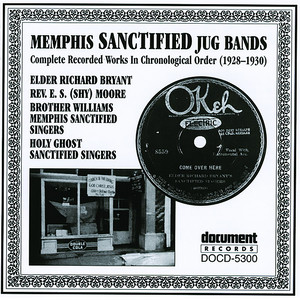
Memphis Sanctified Jug Bands 1928-1930
- 流派:Blues 蓝调
- 语种:英语
- 发行时间:1994-01-01
- 类型:录音室专辑
- 歌曲
- 时长
简介
Document's Memphis Sanctified Jug Bands 1928-1930 brought into general availability 21 recordings made in one of the South's largest African-American communities by four ensembles that combined exuberant Christian worship with the kind of instrumentation made famous by the Memphis Jug Band and Gus Cannon's Jug Stompers. That means kazoo, harmonica, banjo, mandolin, guitar, piano, washboard, and at least one person blowing bass tones across the mouth of a big ceramic whiskey jug, with rhythmic handclapping and maybe a brass cornet or trumpet to help establish and define the melody. Even those who have no interest in or inclination toward organized religion may enjoy these exercises in holy rolling, especially the explosive "Come Over Here," "How Much I Owe for Love Divine," "Lord, Lord, He Sure Is Good to Me," and "Watch Ye, Therefore, You Know Not The Day." These constitute the complete Okeh recordings of Elder Richard Bryant's Sanctified Singers. Bryant's Victor recordings, (tracks 1-2 and 7-13, which include three previously unreleased alternate takes) are emphatically ground-out sermons followed by musical post-ludes. "Everybody Was There," which was harvested from a very scratchy phonograph record, closes with a melody that shows up in early 20th century North American music with worldly titles like "Keep A-Knockin' But You Can't Come In" and "Bucket's Got a Hole in It (Won't Hold No Beer)." For some people, the audio distortion on a record like this adds to rather than detracts from the thrill and wonderment of the historic playback experience. During the two Victor recordings by the impassioned Rev. E.S. (Shy) Moore, the gentle singing of the congregation behind him is an especially beautiful example of traditional African-American group ritual.


![Dreamgirls (Music from the Motion Picture) [Deluxe Edition]](http://y.gtimg.cn/music/photo_new/T002R90x90M000000auXVr4DW8Qf.jpg?max_age=2592000)




